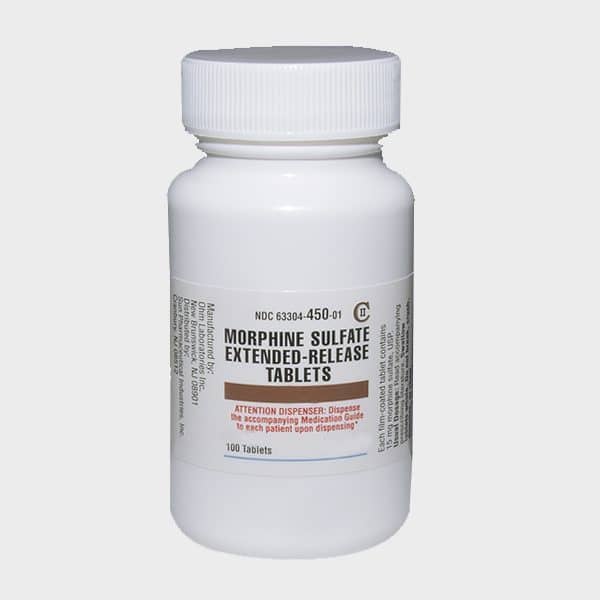- Your cart is empty
- Continue Shopping
Product
Morphine Sulfate may be habit forming, especially with prolonged use. Take morphine exactly as directed. Do not take more of it, take it more often, or take it in a different way than directed by your doctor. While you are taking morphine, discuss with your healthcare provider your pain treatment goals, length of treatment, and other ways to manage your pain. Tell your doctor if you or anyone in your family drinks or has ever drunk large amounts of alcohol, uses or has ever used street drugs, or has overused prescription medications, or has had an overdose, or if you have or have ever had depression or another mental illness. There is a greater risk that you will overuse morphine if you have or have ever had any of these conditions. Talk to your healthcare provider immediately and ask for guidance if you think that you have an opioid addiction or call the U.S. Substance Abuse and Mental Health Services Administration (SAMHSA) National Helpline at 1-800-662-HELP.
Morphine Sulfate may cause serious or life-threatening breathing problems, especially during the first 24 to 72 hours of your treatment and any time your dose is increased. Your doctor will monitor you carefully during your treatment. Your doctor will adjust your dose carefully to control your pain and decrease the risk that you will experience serious breathing problems. Tell your doctor if you have or have ever had slowed breathing or asthma. Your doctor may tell you not to take morphine. Also tell your doctor if you have or have ever had lung disease such as chronic obstructive pulmonary disease (COPD; a group of lung diseases that includes chronic bronchitis and emphysema), a head injury, a brain tumor, or any condition that increases the amount of pressure in your brain. The risk that you will develop breathing problems may be higher if you are an older adult or are weakened or malnourished due to disease. If you experience any of the following symptoms, call your doctor immediately or get emergency medical treatment: slowed breathing, long pauses between breaths, or shortness of breath.
Taking certain other medications during your treatment with morphine may increase the risk that you will experience breathing problems or other serious, life-threatening breathing problems, sedation, or coma. Tell your doctor if you are taking or plan to take any of the following medications: benzodiazepines such as alprazolam (Xanax), diazepam (Diastat, Valium), estazolam, flurazepam, lorazepam (Ativan), and triazolam (Halcion); cimetidine (Tagamet); other narcotic pain medications; medications for mental illness or nausea; muscle relaxants; sedatives; sleeping pills; or tranquilizers. Your doctor may need to change the dosages of your medications and will monitor you carefully. If you take morphine with any of these medications and you develop any of the following symptoms, call your doctor immediately or seek emergency medical care: unusual dizziness, lightheadedness, extreme sleepiness, slowed or difficult breathing, or unresponsiveness. Be sure that your caregiver or family members know which symptoms may be serious so they can call the doctor or emergency medical care if you are unable to seek treatment on your own.
Drinking alcohol, taking prescription or nonprescription medications that contain alcohol, or using street drugs during your treatment with morphine increases the risk that you will experience breathing problems or other serious, life-threatening side effects. If you are taking Avinza brand long-acting capsules, it is especially important that you do not drink any drinks that contain alcohol or take any prescription or nonprescription medications that contain alcohol. Alcohol may cause the morphine in Avinza brand long-acting capsules to be released in your body too quickly, causing serious health problems or death. Do not drink alcohol, take any prescription or nonprescription medications that contain alcohol, or use street drugs during your treatment with other morphine products.
Do not allow anyone else to take your medication. Morphine may harm or cause death to other people who take your medication, especially children. Keep morphine in a safe place so that no one else can take it accidentally or on purpose. Be especially careful to keep morphine out of the reach of children. Keep track of how many tablets, or capsules, or how much liquid is left so you will know if any medication is missing. Dispose of any unneeded morphine capsules, tablets, or liquid properly according to instructions. (See STORAGE and DISPOSAL.)
Swallow the extended-release tablets or capsules whole. Do not split, chew, dissolve, or crush them. If you swallow broken, chewed, crushed, or dissolved extended-release tablets or capsules, you may receive too much morphine at once instead of receiving the medication slowly over time. This may cause serious breathing problems or death. If you are unable to swallow the capsules whole, follow the instructions in the ”HOW should this medication be used?” section below to dissolve the capsule contents in applesauce.
Morphine Sulfate oral solution (liquid) comes in three different concentrations (amount of medication contained in a given amount of solution). The solution with the highest concentration (100 mg/5 mL) should only be taken by people who are tolerant (used to the effects of the medication) to opioid medications. Each time you receive your medication, check to be sure that you receive the solution with the concentration prescribed by your doctor. Be sure that you know how much medication you should take and how to measure your dose.
Tell your doctor if you are pregnant or plan to become pregnant. If you take Morphine Sulfate regularly during your pregnancy, your baby may experience life-threatening withdrawal symptoms after birth. Tell your baby’s doctor right away if your baby experiences any of the following symptoms: irritability, hyperactivity, abnormal sleep, high-pitched cry, uncontrollable shaking of a part of the body, vomiting, diarrhea, or failure to gain weight.











Reviews
There are no reviews yet.